by Ocean Robbins: Thomas Edison hated sleep. Sleeping, he argued, was unproductive, while working was productive…
He grudgingly gave himself four hours a night, and insisted that his employees do the same, arguing that it was only those willing to stay awake all hours who would come out on top in a technologically advancing world.
Edison’s legacy is still with us in two ways. First, the ethos of “manly wakefulness” still pervades much of our culture, especially our worship of startup founders who consume nothing but Red Bull and Snickers while coding, unblinking, 36 hours a day for five years straight until they create the next Google, Facebook, or Uber.
Second, Edison’s lab invented the one device that, more than any other, enabled us to stay awake at all hours: the lightbulb.
Edison himself lived an incredibly productive life and died at the ripe old age of 84, which isn’t a particularly convenient fact to share in an article about the perils of sleep deprivation. On the other hand, Edison was also a vegetarian, and according to Mina, his wife, a very health-conscious one. So perhaps it’s fitting that good old Thomas Alva Edison’s example kicks off this piece about how lifestyle, and particularly food and beverages, can help with sleep.
The Sleep Deprivation Epidemic
The daily decision to shortchange sleep has reached epidemic proportions in much of the world. Seventy million Americans, or about a quarter of the population, have at least one sleep disorder. Europeans are a little better off, with 45 million of them (or six percent) suffering from a diagnosable sleep condition. Throughout the industrialized world, rates of insomnia range from 10–30%.
It’s not just that we’re groggy, distracted, and irritable prior to our morning cup of coffee; lack of sleep can significantly degrade our physical and mental health. Here’s the shortlist of the medical risks that increase when we don’t get sufficient restorative sleep on a regular basis: hypertension, type 2 diabetes, obesity, depression, heart attack, dementia, and stroke — and there’s also an increased risk of auto accidents and mental health challenges.
Those are just the direct effects. Lousy sleep patterns can undermine our health in a roundabout way, too, by changing how we eat. When we’re sleep deprived, we tend to make worse dietary choices, most of which add empty calories that can further harm us.
In a previous article, I covered the topic of lifestyle change to improve sleep quantity and quality broadly. Here, we’ll focus specifically on food and drink. We’ll look at some foods that can help you get those zzz’s (or even zzzz’s, if you’re an overachiever). We’ll explore what science knows about the timing of eating and sleeping, and you’ll take away some great recipes that can help you enjoy better sleep.
Why Sleep Is Such an Issue for So Many

Before we dive into solutions, let’s quickly remind ourselves that for most of human history, sleep wasn’t a problem. We are hardwired to fall asleep when we’re tired and wake up when we have slept enough.
Our sleep drive (or our need for sleep) functions pretty much like our hunger drive. Don’t eat for a while, and you get more and more hungry, to the point where raw zucchini starts looking delicious; eat a big meal, and you lose your appetite. In the same way, we get more and more tired the longer we stay awake. While we sleep, the sleep drive diminishes until it’s weak enough to be overbalanced by the circadian impulse to get up and get moving.
So, what’s changed since the good old days when humans didn’t need alarm clocks and caffeine to wake up (or Ambien and wine to fall asleep)? Well, modern society isn’t exactly friendly to healthful sleep.
Electric lighting, as we’ve seen, has probably made the biggest difference. Pre-Edison, you went to bed when it got dark (unless you were up to no good, or trying to catch people who were up to no good). Candles, fireplaces, and kerosene lanterns could keep you from bumping into walls, but they were expensive as well as dangerous. (Just ask Mrs. O’Leary’s neighbors the morning of October 9, 1871, after the blaze that started in her barn and destroyed most of Chicago.) With the advent of the lightbulb (and the electrical grid to power it), day and night could now become interchangeable.
Information Overload
We’ve also got more to keep track of these days. Social media and the 24-hour news cycle mean that something’s always happening somewhere, and many of us feel compelled to stay on top of all of it. (“What if I go off-grid for 20 minutes and miss the announcement that mullets are back?”)
In addition to this constant bombardment with information, we’ve also become a society of mindless scrollers and binge-watchers. Those who use social media the most, especially right before bed, experience the greatest disruptions in sleep.
Blue Light
It’s not social media, in particular, though; the same is true of those who watch TV, play video games, or otherwise interact with their computers, tablets, and smartphones prior to nodding off. Part of the problem with these devices may be the band of the visible light spectrum they emit. Digital devices are heavy on blue light — which the color-perceiving cells in our eyes interpret as daytime sun, sending “wakey-wakey” signals to the rest of our bodies.
Blue light suppresses the production of melatonin at night, making it harder to fall asleep and stay asleep. Some studies even suggest a link between exposure to blue light at night and an increased risk of Type 2 diabetes, heart disease, and obesity. The relatively new science of chronobiology is exploring the mechanisms whereby fooling our bodies into thinking it’s perpetual daytime can wreak havoc on our endocrine systems, too.
Mental Health
Industrialized societies also threaten our mental health, which can compromise sleep. Approximately half of all insomnia cases are related to depression, anxiety, or psychological stress. Given the high rates of these conditions in the US, in particular, it’s no surprise that so many people report difficulty sleeping.
Not only can mental health issues and stress lead to disturbed sleep, but causation works in the other direction as well. A lack of healthy sleep can lead to psychological problems and make us far more susceptible to stress. Have you ever flipped out after a poor night’s sleep over some kind of situation that wouldn’t merit a second thought otherwise? I sure have, and I think this is more common than we often recognize.
Shift Work
One group suffers even more than the rest when it comes to disturbed sleep: shift workers. They’ve even come to have their very own International Classifications of Disease (ICD) disorder: Shift Work Sleep Disorder (SWSD). Those who work at night (or who have shifts that vary from week to week) are susceptible to the worst effects of sleep deprivation. They frequently have trouble sleeping and experience excessive drowsiness and fatigue that can interfere with overall functioning. They tend to have more anxiety and depression than average, and suffer from worse physical and mental health.
Even in the most extreme shift jobs, though, it’s possible to adopt practices for better, more regular, and more restorative sleep. Food turns out to be a central pillar — including meal and snack timing — as well as specific nutrients that can provide support for a better night’s sleep.
Why Meal Timing Is Important
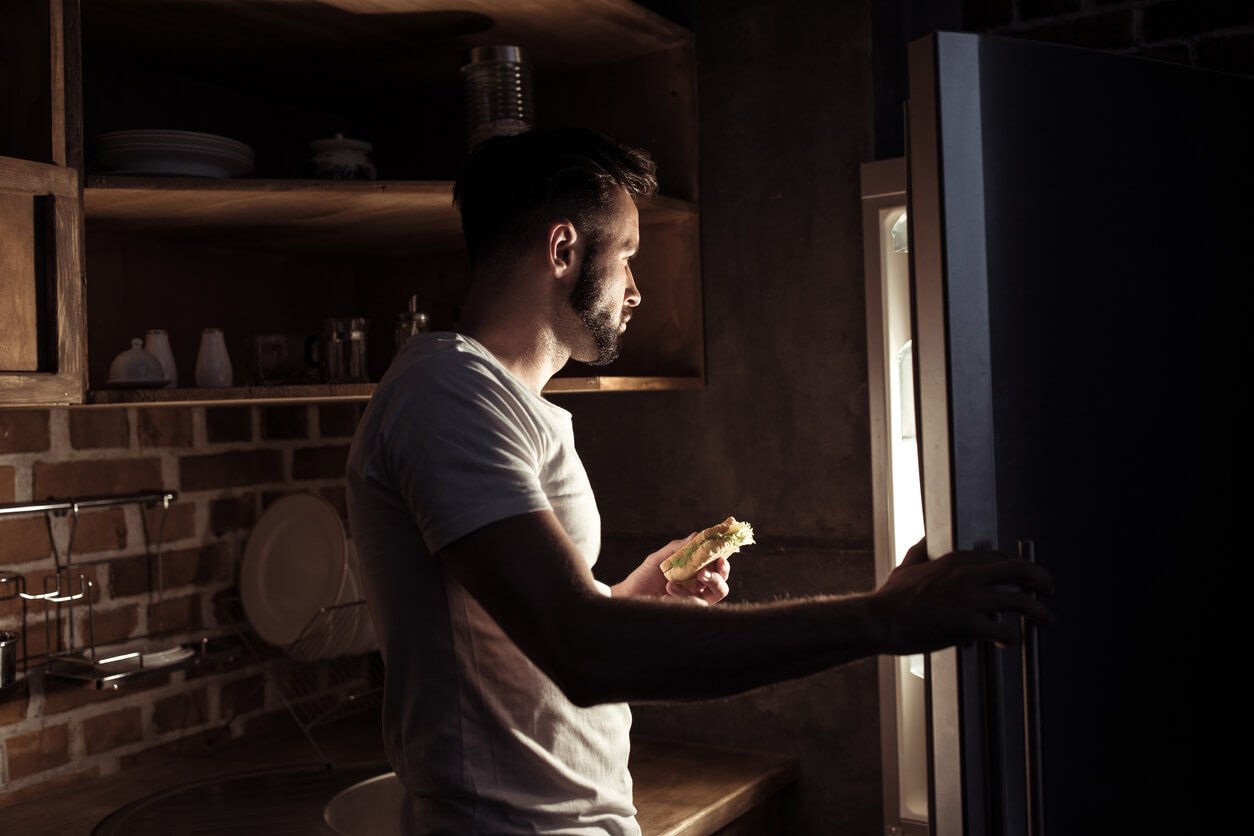
Sleep and meal timing can impact hormonal levels that, in turn, influence satiety and food intake. The hormones your body makes and deploys rise and fall in quantity throughout the day. At certain times of day you’re hungrier, and at other times you’re not so hungry. Sometimes your body prefers to store fat, and sometimes it would rather burn fat.
One of the hormones known to be sensitive to timing is ghrelin, also known as the hunger hormone. Interestingly, even though ghrelin (from the Proto-Indo-European language root for “grow”) wasn’t discovered until 1999, the titular characters in the 1984 film Gremlins (which looks and sounds a lot like “ghrelin,” does it not?) turn bad when they eat after midnight. Coincidence? I’ll leave that to you.
While eating late at night might not turn you into a Gremlin, it can interfere with sleep quality and brain health. Even small snacks in the late evening can turn on the whole digestive system. If you go to sleep on a full stomach, your body has to split its energy between digestion and all the things your brain needs to do during sleep. (Insulin sensitivity is also highest in the morning, which means that for most people morning is the optimal time to eat.)
Fasting can help or hurt your sleep, depending on timing. Basically, humans evolved to eat during the daytime and not eat at night. If you fast all day and eat a big meal right before bed, your body can get confused and think that it’s time to go out to do stuff just when you’re turning down the sheets. When your body gets a big surge of calories but has no immediate need to burn them, it is also more inclined to store them as fat.
Nutrients That Impact Sleep
Before I give you a list of specific foods that can improve your sleep, let’s talk at a higher level for a bit. What are the specific nutrients in foods that can help you go to sleep easily and stay asleep until you’re fully rested?
Fiber
Getting enough dietary fiber is key to a good night’s sleep. A 2016 study found that greater fiber intake predicted more time spent in the stage of deep, slow-wave sleep, which is most restorative. And, data from a survey of US adults revealed an association between the daily intake of total fiber and total sleep duration. Those who got a “normal” amount of sleep (defined as seven to eight hours per night) also had the highest fiber intake.
Folate
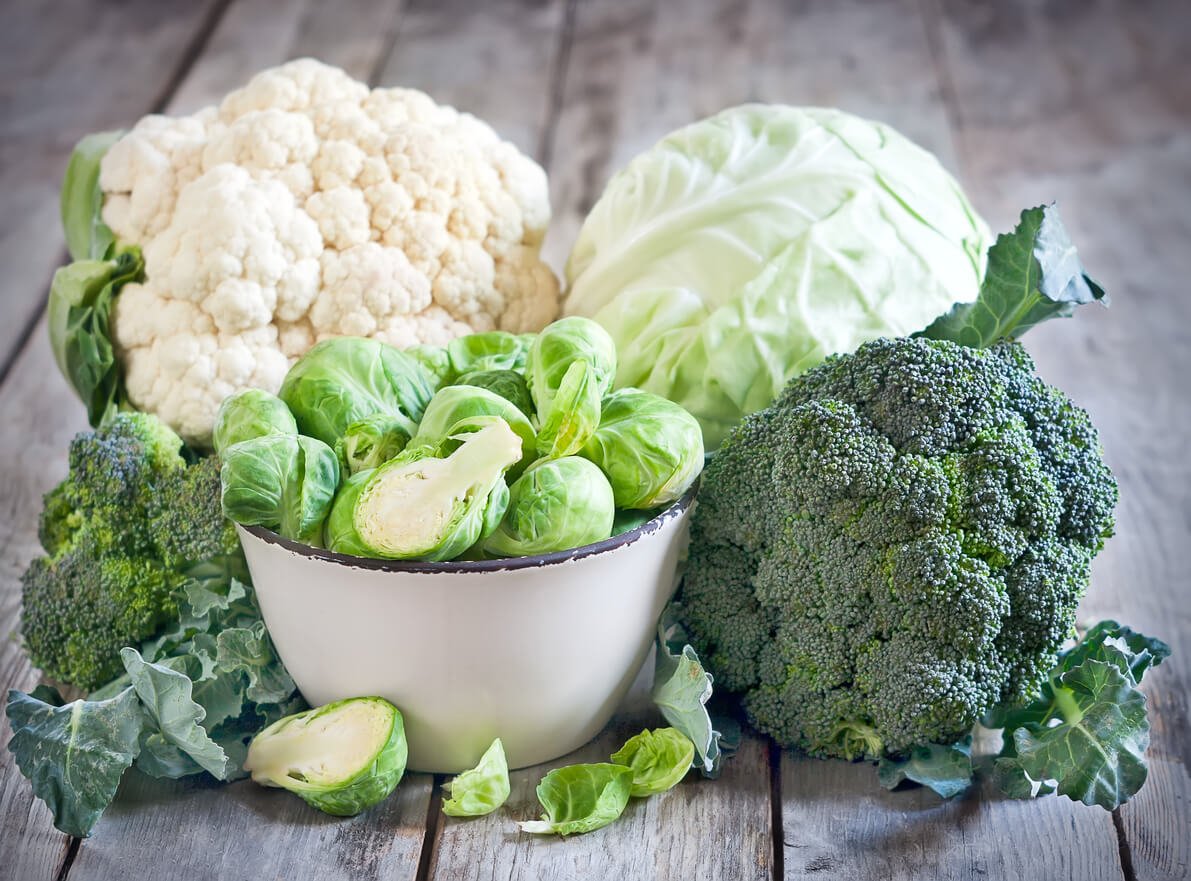
Folate (not to be confused with folic acid) has been linked to lower rates of both insomnia (defined as difficulty initiating or maintaining sleep, and/or extended periods of wakefulness) and restless leg syndrome. Getting enough folate also appears to make you more likely to feel sleepy at bedtime and more resilient in the face of sleep disturbances.
Complex Carbohydrates
Complex carbohydrates (found in whole plant foods) raise serotonin, a neurotransmitter that basically orients you towards contentment. When you’re satisfied and grateful, you don’t have to chase after the next meal or avoid the next predator, so you tend toward relaxation and even drowsiness. Complex carbohydrates also lower the stress hormone cortisol. High levels of cortisol inhibit sleep, as we tend to do our best fighting or fleeing while awake.
A remarkable study on the sleep quality of obese security guards found that diets rich in complex carbohydrates resulted in significantly longer sleep durations.
Isoflavones
Isoflavones are a class of phytoestrogens (that is, plant-based molecules that resemble and to some extent mimic the function of the sex hormone estrogen) found in plant foods. Daily isoflavone intake may have a beneficial effect on sleep. In a 2015 Japanese study of over 1,000 participants, higher isoflavone intake resulted in better sleep duration and quality.
We know that for postmenopausal women who find themselves struggling to get a good night’s sleep, estrogen replacement therapy can sometimes alleviate symptoms of insomnia and increase sleep efficiency. Isoflavones, possibly like other phytoestrogens, may have similar effects with fewer unwanted side effects.
Magnesium
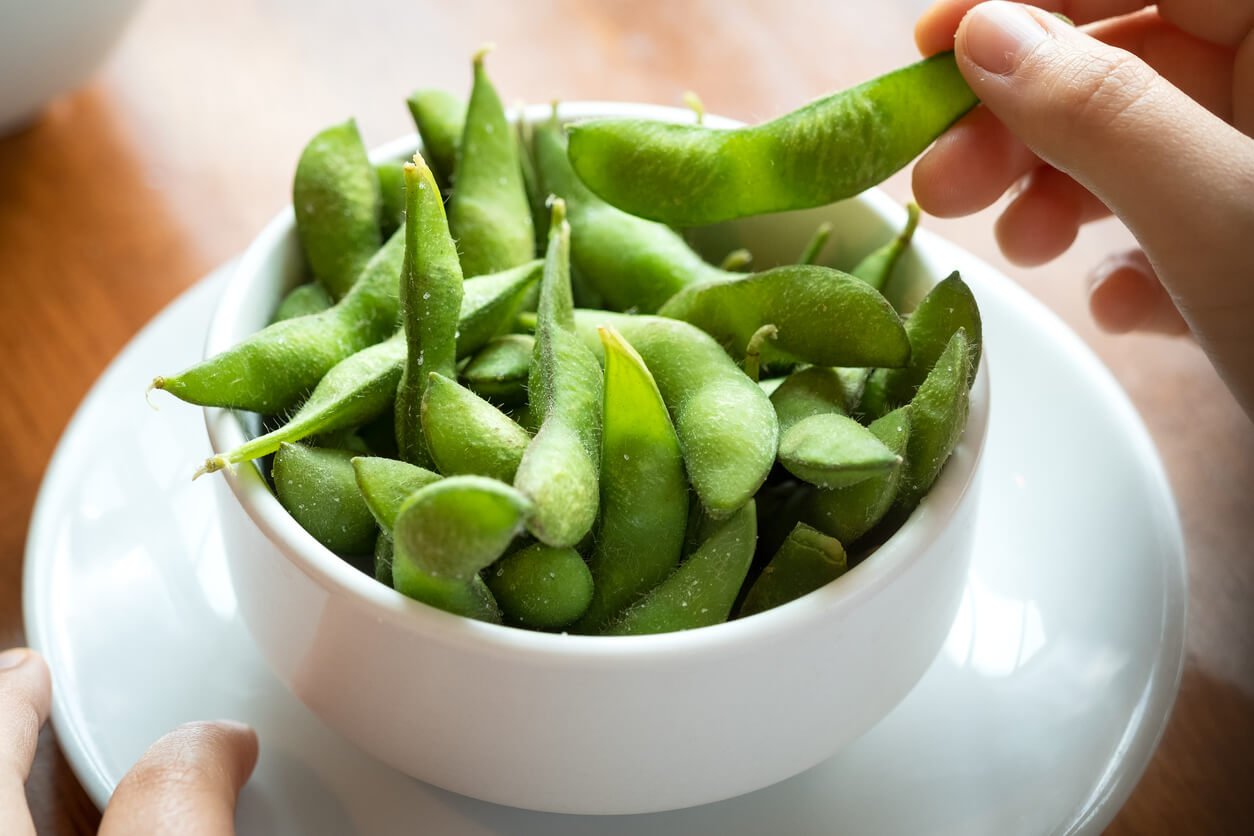
Magnesium is a key mineral for sleep. Low levels are associated with poor sleep quality and insomnia. There may be multiple mechanisms at work here; not only can magnesium deficiency compromise sleep directly, but it’s also correlated with anxiety and depression — both of which can also contribute to an inability to fall and stay asleep.
Consuming more magnesium can improve subjective measures of insomnia such as sleep efficiency, sleep duration, and sleep onset latency (which just means how long it takes you to fall asleep). For various reasons most of us don’t get enough magnesium in our diets, making it a “usual suspect” nutrient to increase in people who are struggling with sleep.
Tryptophan
Tryptophan, an essential amino acid, is the precursor to serotonin (the “Relax, everything is hunky-dory at the moment” neurotransmitter we’ve already met) and melatonin, a hormone that we will meet shortly. As a neurotransmitter, tryptophan is key to our ability to regulate mood and cognition.
Some of the benefits of adequate tryptophan intake include reductions in obstructive sleep apnea and improvements in sleep latency and REM sleep (the phase in which you dream and decouple emotions from events so you don’t go through life in a constant state of fear).
Cereals fortified with tryptophan have been found to increase sleep efficiency and sleep time, and decrease symptoms of anxiety and depression.
Melatonin
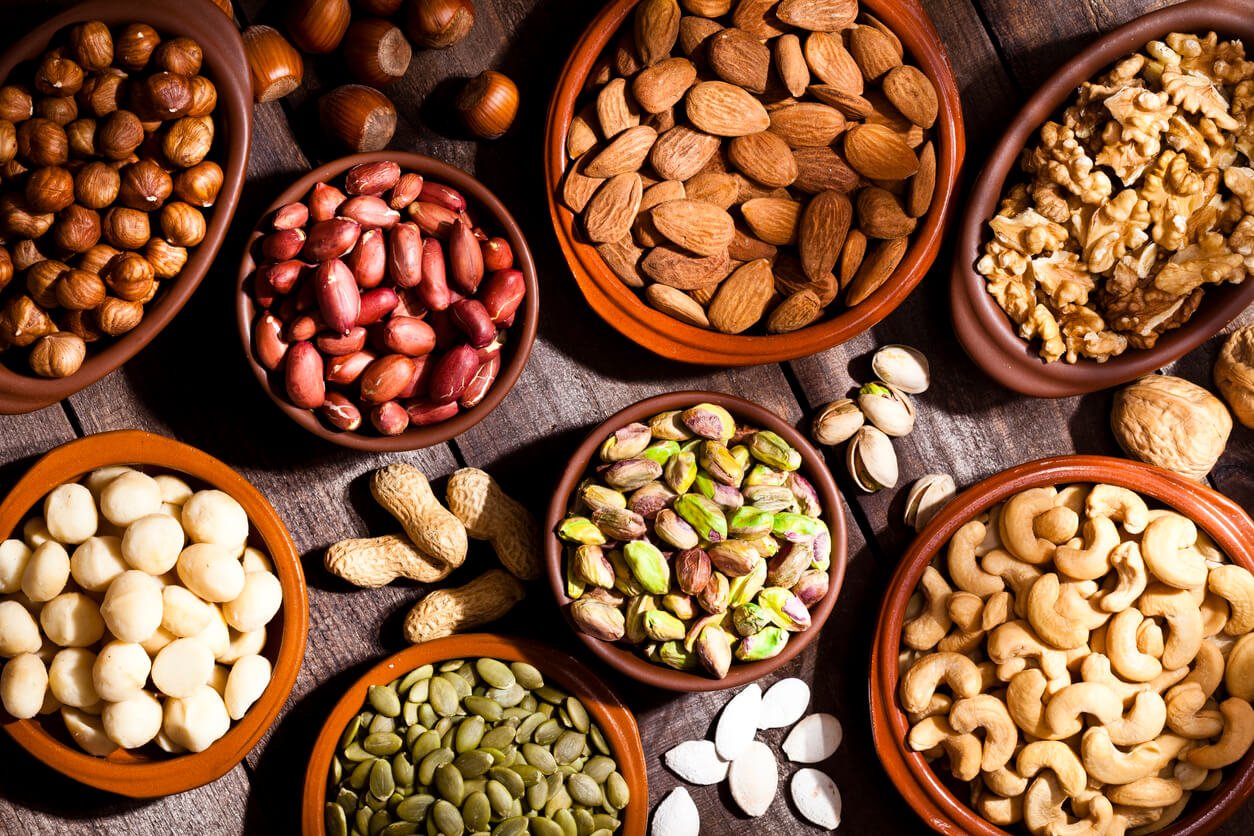
Melatonin is a hormone produced in the pineal gland that helps with sleep initiation and maintenance. It modulates your circadian rhythm, so it’s one of the key things that has to catch up and reintegrate if you travel to a different time zone or shift your pattern of sleep and wakefulness.
Your body uses tryptophan to help make melatonin. You can also get melatonin in certain foods. There’s evidence that consuming sufficient amounts of these foods can improve sleep, and health, in general, by increasing the circulating levels of melatonin in your body.
Best Plant-Based Foods to Sleep Better
Now that we’ve established the nutrients related to better sleep, let’s identify some specific foods that contain those nutrients — some of which may improve sleep quality.
Pumpkin Seeds
Pumpkin seeds contain high levels of tryptophan and magnesium and can improve sleep onset latency and sleep quality. They are so high in magnesium, in fact, that just three ounces of roasted seeds exceed the recommended daily value for that nutrient.
While it’s easy to take magnesium supplements to meet your daily requirements, there’s some evidence that getting magnesium from food may have long-term benefits. One study, for example, found that dietary magnesium helped very tired women stay awake during the day.
Kiwis
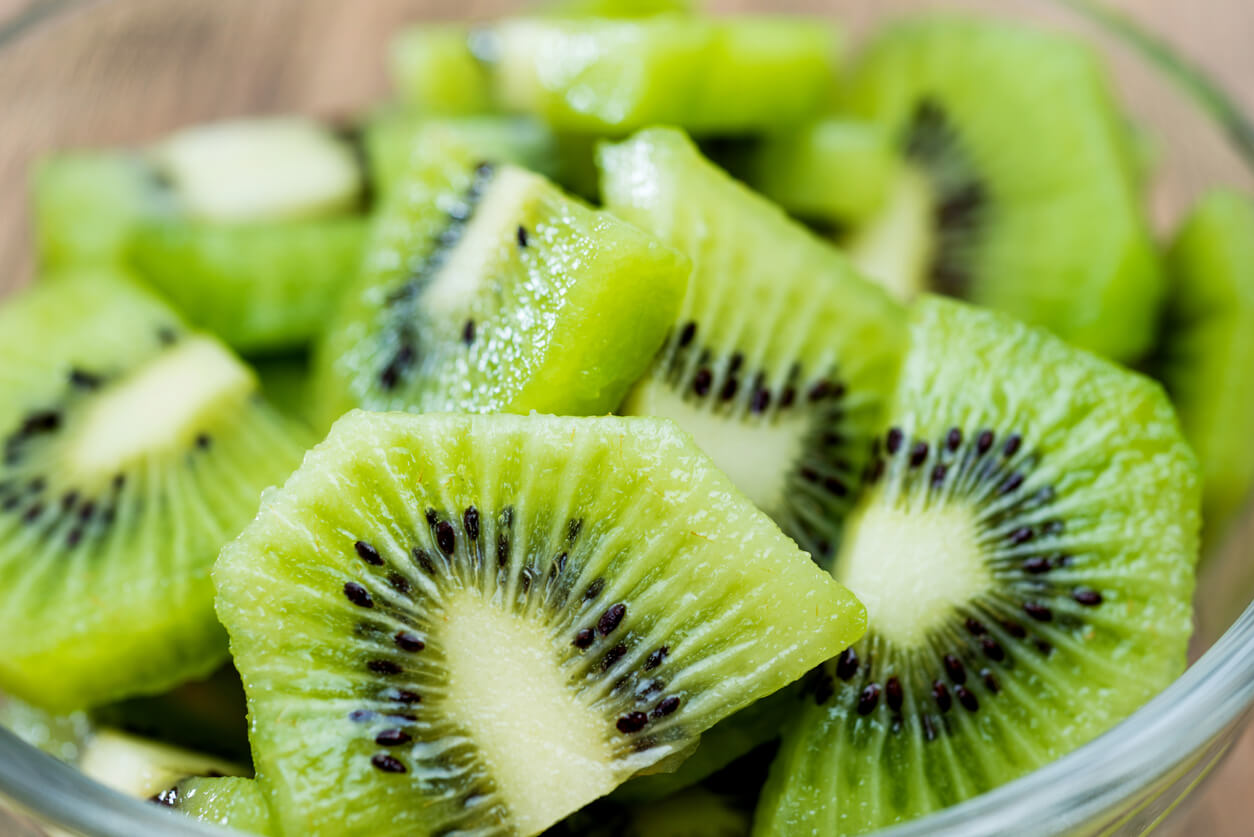
In addition to being rich sources of antioxidants, kiwis also contain serotonin and folate, all of which may contribute to the sleep benefits of the fruit. As a result, you might expect kiwifruit consumption to help people sleep longer and better, and a 2011 study found just that. Twenty-four adults had to eat two kiwis each evening, and after four weeks, they were falling asleep faster and staying asleep longer.
Mushrooms
Mushrooms, in general, are good sources of melatonin and folate. One variety, in particular, (Hericium Erinaceus, known more commonly as lion’s mane) shows promise to decrease depression, anxiety, and sleep disorders in overweight and obese individuals.
Whole Grain Rice
Whole grain rice (as opposed to polished white rice, which has had the hull removed) is a complex carbohydrate, which we’ve already seen is a class of nutrient conducive to improved sleep. Red and black varieties of rice have the highest levels of melatonin.
In a 2020 study, sleep quality index scores showed significant improvement on a diet that featured rice along with miso and other traditional Japanese dishes.
Oats
Oats, another complex carbohydrate, are another type of grain boasting some of the highest concentrations of melatonin. They also contain magnesium and are a rich source of soluble fiber.
Pistachios
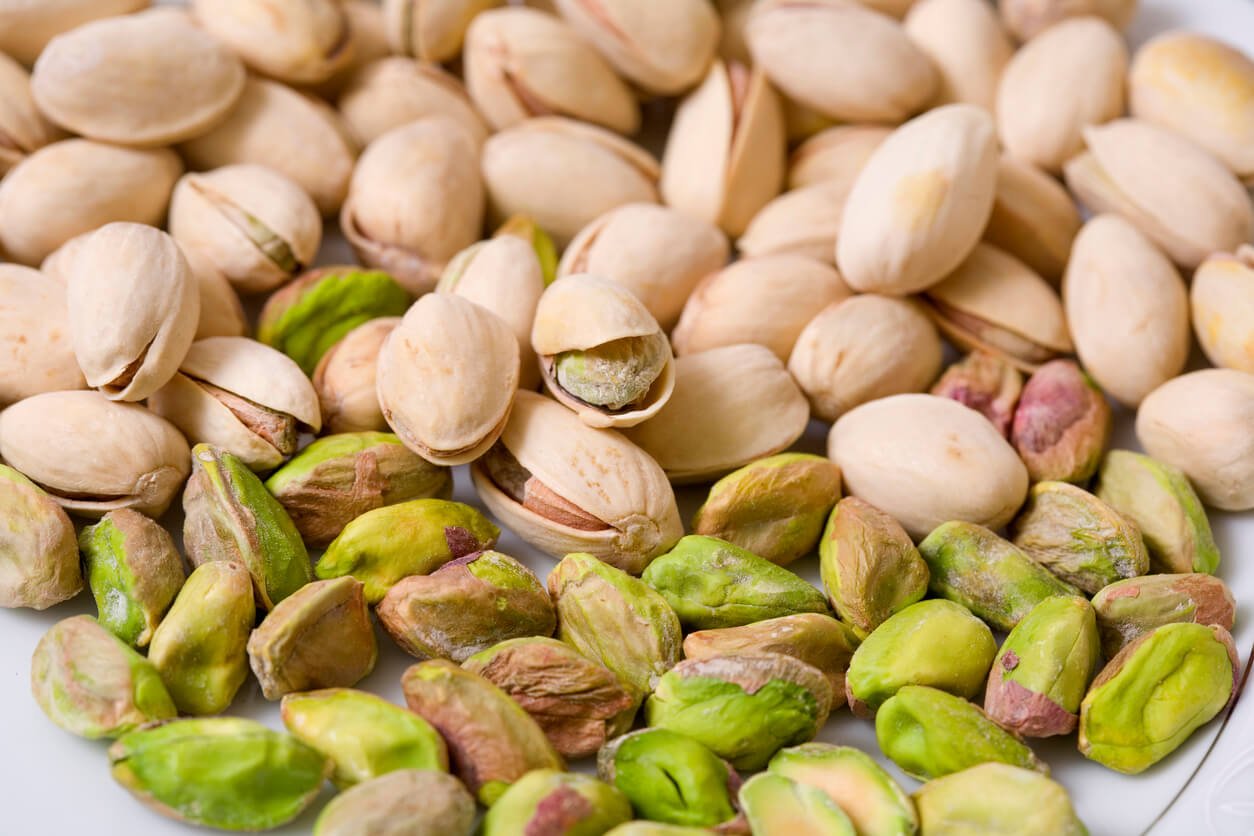
Pistachios can improve sleep thanks to the isoflavones they contain, as well as their very high levels of melatonin. They’re also a good source of magnesium and folate.
Almonds
Almonds contain sleep-promoting nutrients like tryptophan, melatonin, and magnesium. A 2019 study looked at the prevalence of insomnia in Iranian students living in university dormitories and found that adding just 10 sweet almonds to their daily diets had a significant positive impact.
Whole Soy Foods
Whole soy foods such as tempeh and edamame are high in magnesium and folate, and they’re a particularly rich source of isoflavones. A 2015 study out of Japan (where consumption of soy foods like tofu and miso is common) followed over 1,000 adults for five years and found that people who ate isoflavones every day enjoyed better sleep duration and quality.
Interestingly, isoflavones might also help protect against getting too MUCH sleep. In fact, a 2017 study found that soy isoflavone intake was associated with a low risk of oversleeping.
Given that so many of us are sleep-deprived, oversleeping might sound like a good thing — but there are also health risks to consistently sleeping more than nine hours per night. So, whole foods can help us reach the “Goldilocks” standard of sleep: not too much and not too little.
Best Beverages to Sleep Better
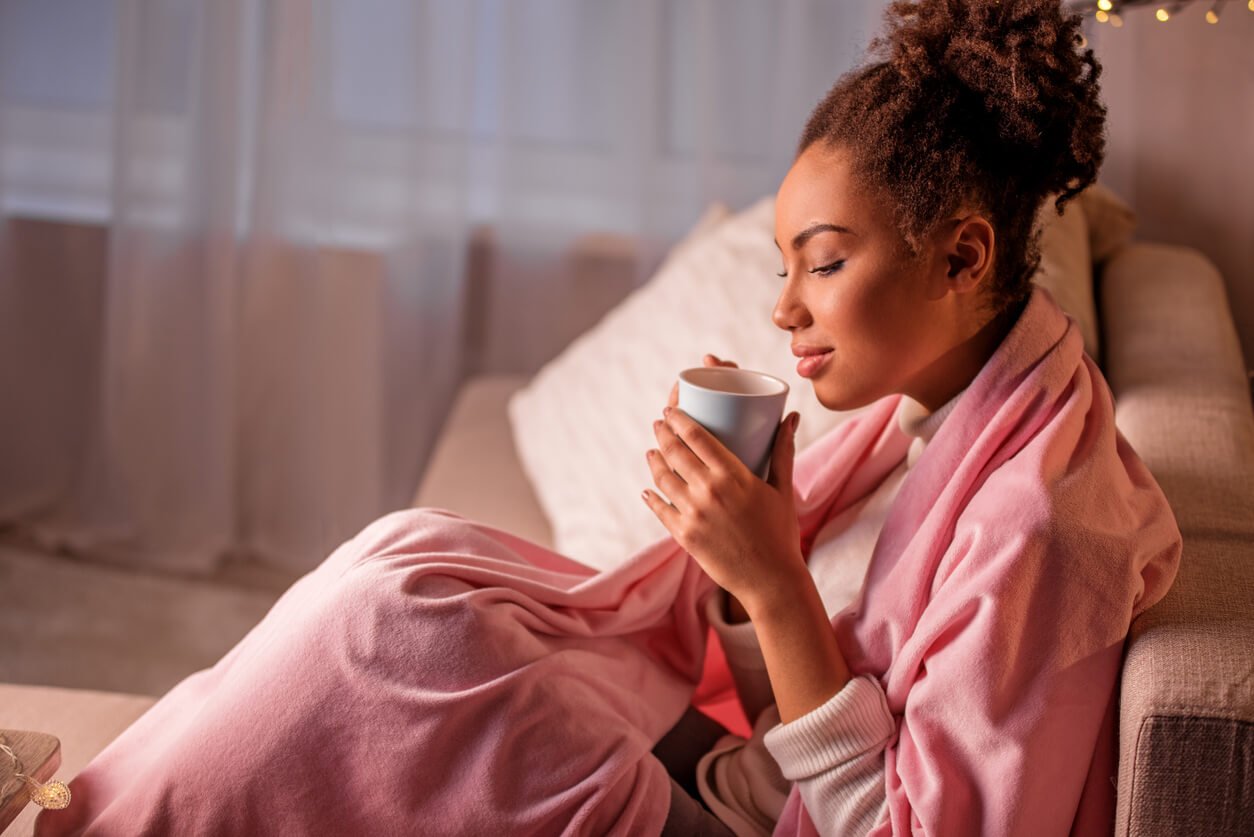
Sleepytime drinks have been popular for a long time. From the Irish hot toddy to the mug of chamomile tea, humans all over the world have been concocting (mostly warm) beverages to help the mind calm down and the body relax.
Warm milk is an oft-suggested pre-sleep drink as it contains tryptophan and melatonin, but there are other beverages with similar effects (minus the negative health and environmental impacts of modern cow’s milk).
Chamomile Tea
Chamomile tea is known as a folk remedy for sleep, and science is beginning to understand. Some of chamomile’s sleep-supporting effects may be due to the flavonoid apigenin, which binds to benzodiazepine receptors in the brain. When put to the test, chamomile tea has been shown to help alleviate depression and improve sleep quality problems in postpartum women.
Tart Cherry Juice
Not all beverages for sleep need to be consumed warm. Tart cherry juice can help with sleep thanks to its high levels of tryptophan, serotonin, melatonin, and antioxidants. Studies show that the juice can improve sleep quality in a couple of ways: by helping people fall asleep faster, and also helping them stay asleep for longer after nodding off.
Lemon Balm Tea
Lemon balm is a perennial herb in the mint family that grows around the world and (in supplement form) has been shown to decrease depression, anxiety, stress, and sleep disorder in patients with chronic stable angina. When combined with another herb, valerian, lemon balm may assist in reducing sleep disorder symptoms in women going through menopause, too. This same combination also improved sleep in primary school children with hyperactivity and concentration difficulties. While these studies mostly explored the effects of herbal supplements, a tea made from fresh or dried lemon balm leaves seems likely to bring about similar effects.
Valerian Tea
Valerian tea comes from the roots and underground stems of the valerian plant, which grows throughout North and South America as well as Europe and China. Depending on your olfactory tolerance and penchant for metaphor, you might describe the odor of valerian tea as “woodsy” or “a lot like dirty gym socks.”
Many studies have demonstrated the soporific (a fancy word for something that makes you drowsy — I knew that word would come in handy someday even if it wasn’t on the SAT vocabulary test) effects of valerian. In addition to the lemon balm/valerian study we’ve already discussed, valerian root has been shown to significantly improve sleep quality, anxiety, and depression in hemodialysis patients. Valerian mixed with hops also helped a group of poor sleepers spend more time in deep sleep.
Lavender Tea
Lavender tea is one of the most common home remedies for insomnia. The oils in the lavender plant are considered safe for treating mild to moderate sleep disturbances. In one study, oral lavender oil showed a significant beneficial influence on quality and duration of sleep. It also buoys the nervous system, improving general mental and physical health without any unwanted sedative effects. Another study has demonstrated beneficial effects on fatigue and depression in postpartum women, to the extent that lavender tea drinkers were actually able to bond more closely with their infants.
Lavender is so nice, you don’t even have to drink it! Lavender’s aromatherapeutic effects can help in facilitating sleep even if you just get a whiff of the herb.
Recipes for Better Sleep
The facts are in: The right foods and drinks can support your ability to enjoy a sound night’s sleep, and good recipes can help!
Make these Toasted Pistachio and Cherry Overnight Oats and enjoy them in the morning. Perhaps you will feel well rested because you enjoyed isoflavone- and melatonin-rich Simple Kung Pao Tofu with Broccoli for dinner, followed by some soothing and comforting Sweet and Nutty Oat Milk with Cinnamon Spice.
If you’re looking for an appetizer or nourishing nibble to support solid sleep, then give these Pumpkin Seed Poppers a try.
Finally, get a nutrient-dense, sleep-supporting smorgasbord of ingredients in with this Greens and Beans Soup. Here’s to sleeping soundly and peacefully!
1. Toasted Pistachio and Cherry Overnight Oats
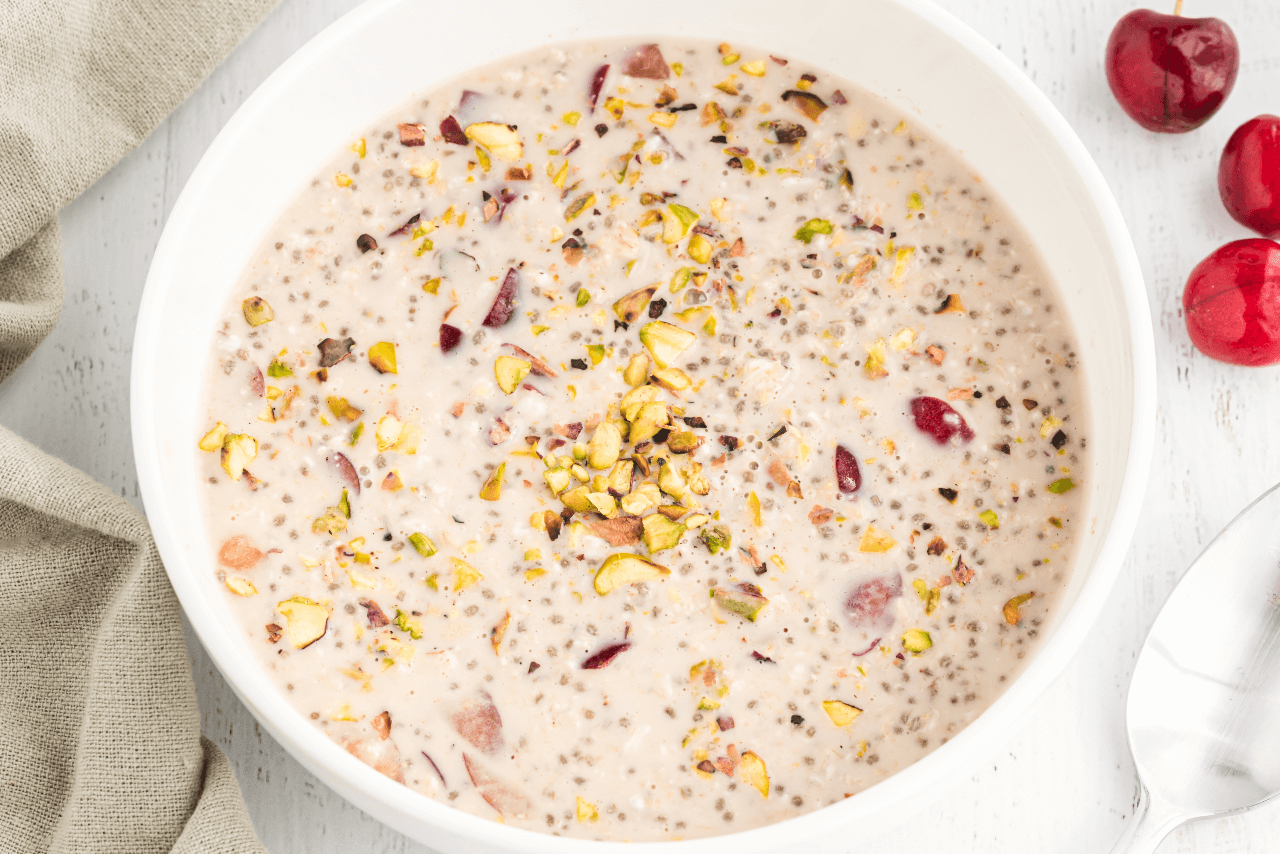
What’s the next best thing to a good night’s sleep? Waking up feeling well and knowing that a delicious breakfast is waiting for you! Okay, that’s two things — feeling great, and a ready-to-eat breakfast. Cherries and pistachios are a culinary match made in heaven, giving traditional oatmeal a flavor and texture lift, not to mention that tart cherries contain melatonin and tryptophan and pistachios contain isoflavones and magnesium — all nutrients that support normal sleep rhythms.
2. Greens and Beans Soup
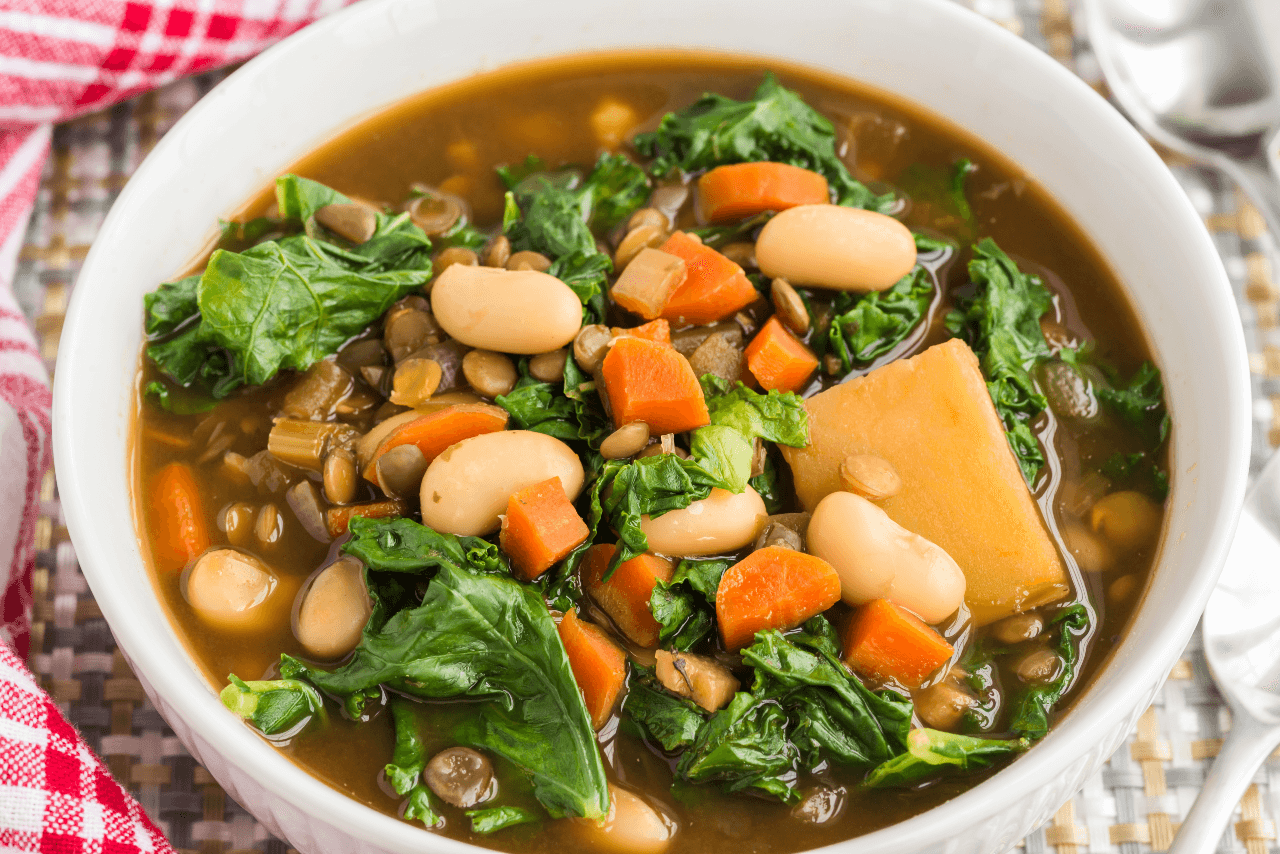
Soup is naturally soothing and calming, creating an atmosphere of relaxation before sleep. There are also specific nutrients in this plant-powered soup that support sleep: complex carbohydrates, including fiber, from the potatoes and legumes, magnesium from the kale, and isoflavones in the miso (if using soy-based miso). Plus, this soup has received rave reviews from those who have tried it!
3. Pumpkin Seed Poppers
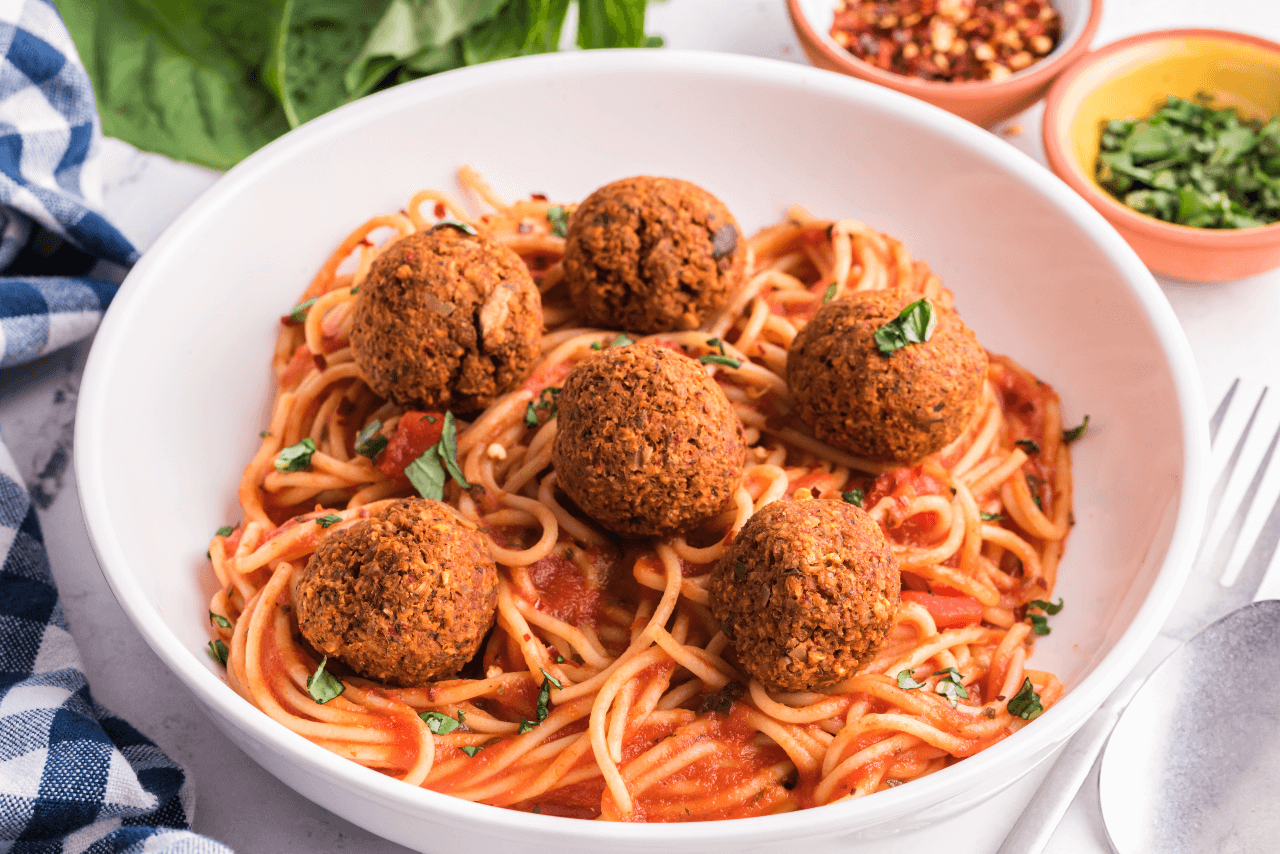
These bite-size appetizers boast several ingredients that can support sleep, including brown rice, pumpkin seeds, and oats. You’ll get plenty of fiber, magnesium, and tryptophan, plus lots of flavor. They’re also very fast to prepare if you have leftover brown rice or quinoa and some roasted red peppers on hand. Fun food alert: The flavors might remind you of pizza!
4. Simple Kung Pao Tofu and Broccoli
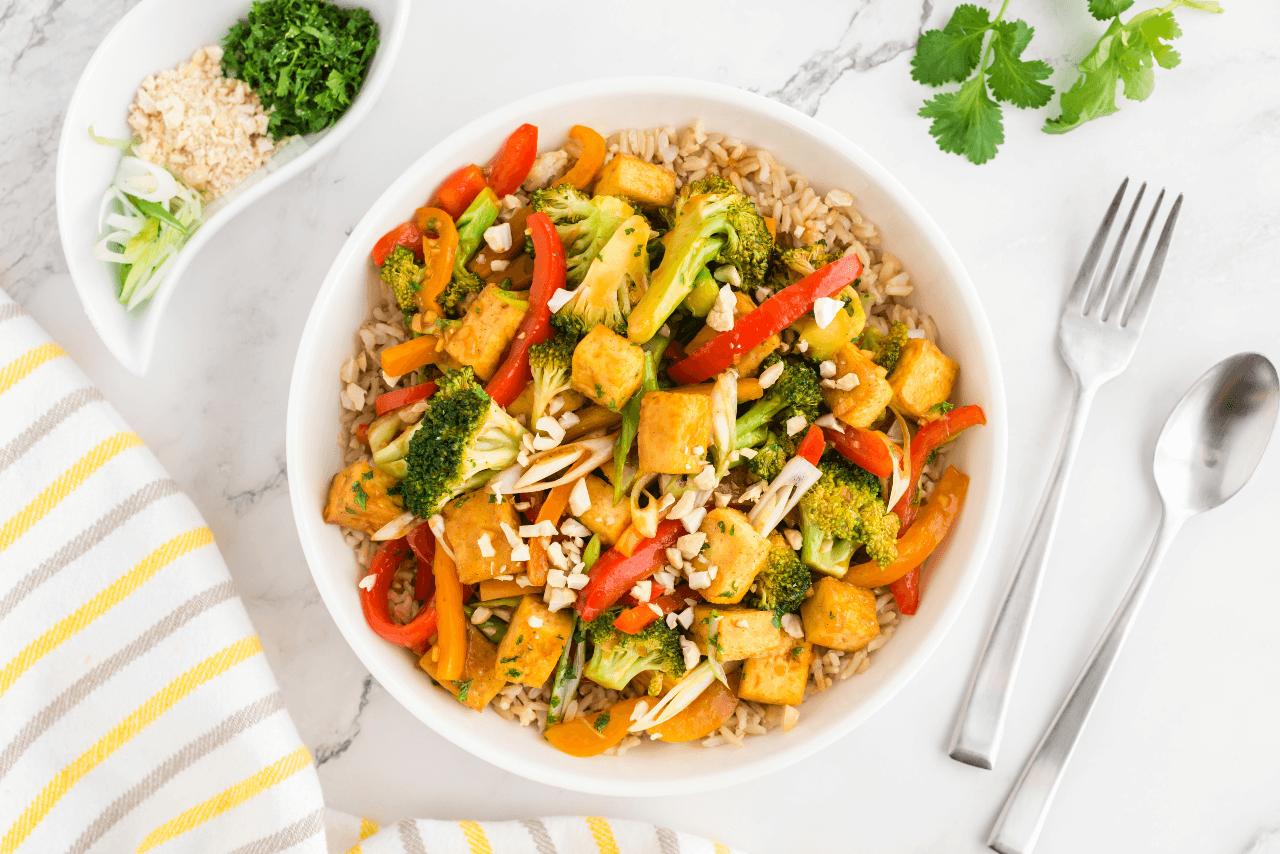
Broccoli for better sleep? You bet! This common (in the best way) crucifer and the peppers in this recipe contain melatonin and the tofu brings in isoflavones, all of which can contribute to sweet, sweet slumber. As for the flavor, this Simple Kung Pao Tofu and Broccoli is a combination of sweet, savory, and spicy, making it super satisfying.
5. Sweet and Nutty Oat Milk With Cinnamon Spice
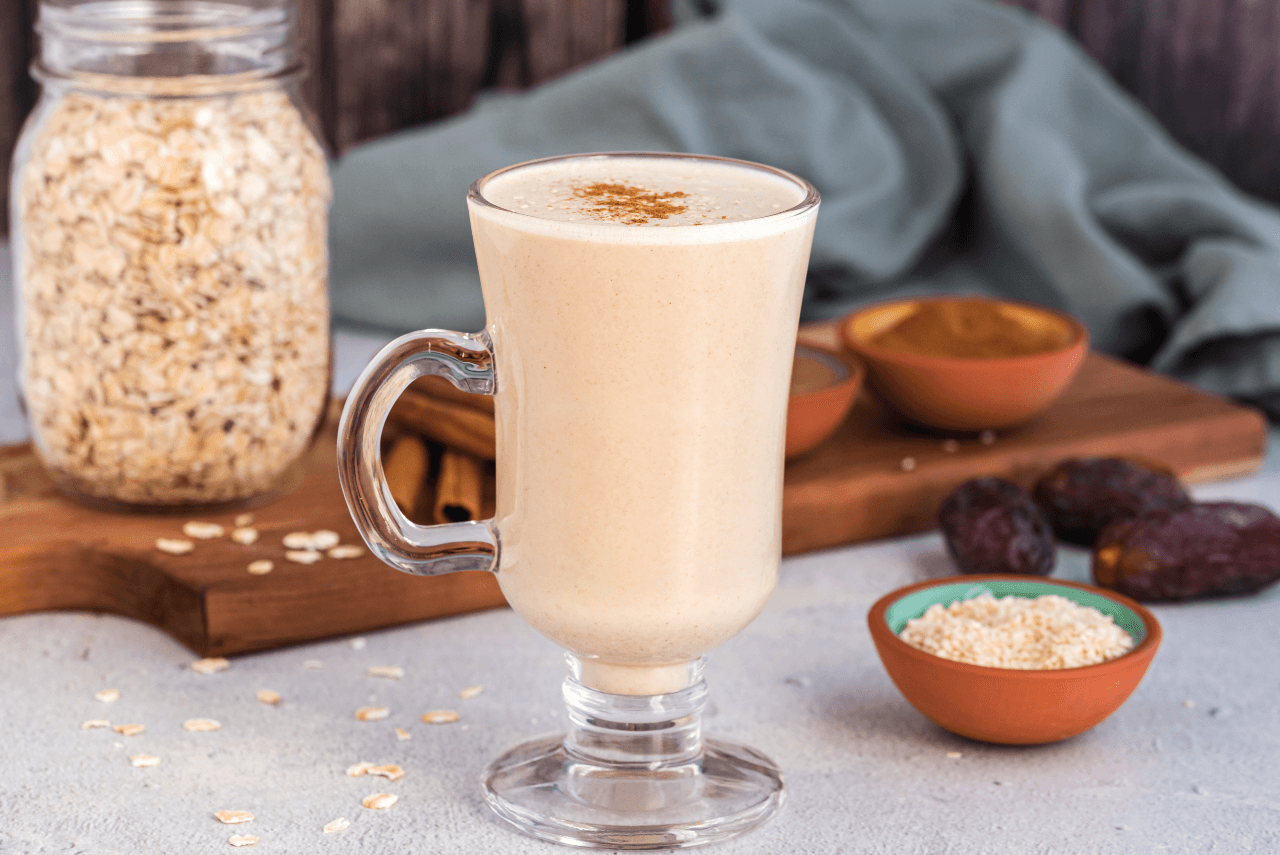
Picture this: You’re about to wind down for the night, sipping on a warm and comforting cup of homemade oat milk with soothing cinnamon, taking a deep breath in and exhaling out all of the busyness from your day. With each sip, you go deeper into relaxation. Creating a ritual like this before bedtime can prepare you for a sound sleep. Plus, oats have lots of melatonin (a hormone that supports a good night’s rest).
Sleep Well
Sleep disorders and disruptions are an issue for many people and are very common in the modern industrialized world. Fortunately, this doesn’t have to be your fate! Eating the right foods at the right times can make a huge difference. Specific nutrients such as tryptophan, melatonin, and magnesium (found in both food and beverages) may help to address sleep concerns. By consuming more of these foods and beverages — as well as modifying your sleeping and eating schedules — you can be well on your way to better sleep.








































